PR careers are great communications jobs for people with a passion for helping a business grow. As PR pro Gini Dietrich reveals in today’s career video, a wide variety of personalities and backgrounds (from liberal arts to business majors) fit in to the public relations field, but great writing skills and understanding how a business makes its money are required for success.
SNEAK PEEK (Full Episode below)
|
RELATED CAREERS |
Today’s Guest
 CEO of PR Agency Arment Dietrich: Gini Dietrich
CEO of PR Agency Arment Dietrich: Gini Dietrich
Gini’s Great Blog: Spin Sucks
College Major: English
College: Creighton University in Omaha, NE
High School: Benson High School in Omaha, NE
First Job Ever: Godfather’s Pizza
Worst Job Ever: B-movie theater with a horrible boss
Role of Public Relations
Gini says helping businesses communicate with their customers is the main role of PR careers. She explains that PR people are strategists and analyzes the relationship between their jobs and the roles of marketing, advertising and sales people. Gini also reviews the different types of public relations from social media marketing to crisis communications to publicity. Gini is tons o’ fun and energy as you’ll see in this video interview – she’s a big fan of chocolate chip cookies and bike riding at the crack of dawn! Apologies for our Skype technical issues – if they distract you, I can tell you the podcast and transcript aren’t affected!
PR Careers
Gini shares great career advice for landing entry level public relations jobs, including the importance of doing PR internships and reading a lot so you can become a better writer. You’ll need to do both of those things whether you’re looking to work in a large agency or a boutique public relations agency like Arment Dietrich. Gini walks us through salary ranges for those starting out and provides lots of good pointers for students and career changers interested in PR careers.
FULL EPISODE (#23)
For our Audio Podcast: Careers Out There on iTunes
TRANSCRIPT OF TODAY’S INTERVIEW
Typical Day in PR Jobs 7:33-12:15
Rewards and Challenges of PR Careers 12:15-14:23
Skills and Personalities for PR Jobs 14:23-16:59
Education for PR Careers 16:59-17:40
Gini Dietrich bio 17:40-22:15
Income for PR Careers 22:15-23:43
Breaking in to Public Relations 23:43-25:56
Keys To Success for PR Careers 25:56
Careers Out There Host Marc Luber: Hey everyone welcome to Careers Out There. I’m your host Marc Luber and we’re helping you find a career that fits you. Today we’re looking at careers in public relations. Our guest is PR pro Gini Dietrich. Gini’s got a ton of experience in the PR space. She’s worked at powerhouse companies like Fleishman Hillard and for the past 5-plus years she’s been founder and CEO of her own boutique PR firm headquartered in Chicago called Arment Dietrich. Gini’s one of the top-rated communication pros on the social networks. She’s got a great blog you should check out at SpinSucks.com. Gini’s got a lot to share with us about PR careers so it’s gonna be a great show. Stick around! [theme song] Alright we’re back. Gini welcome to Careers Out There!
Public Relations Pro Gini Dietrich: Thanks Marc. Thanks for having me!
[ROLE OF PUBLIC RELATIONS starts at 0:53]
Host Marc Luber: Yeah, thanks for being here. So tell us what is PR? And what does someone who works in public relations do?
PR Pro Gini Dietrich: So public relations – it’s almost easier to explain what it’s not. When you…. “Wag the Dog”, “Sex In the City”, there’s a new show called “Spin Industry” that Kim Kardashian is doing – when you see the PR industry in movies and on TV, it’s really portrayed as event planning, planning big parties, hanging out with celebrities or in the “Wag the Dog” example, making up something to get away from the real news – to divert attention away from the real news. That’s not what we do. So what we DO do as public relations professionals is we really help businesses communicate with their customers. Their customers could be employees, their customers could be the people who buy their product or service, their customers could be the board, their stakeholders, their investors if it’s a Fortune 500 company or a publicly traded company…so when I talk about customers I’m really talking about the people that are involved in some way in the company. So we teach them how to communicate with their customers. And it’s really – you’d be really surprised at how many people don’t know how to communicate – and how they believe – it’s sort of this mantra of “we as executives talk and you as employees listen” and what we do is we change that so that it’s a 2-way street and you get that back and forth communication – both with your employees and your stakeholders AND your customers. And what the web is really doing is allowing us a 2-way street between businesses and customers in order to be able to have those conversations both ways instead of – in the old world it was we would send out a news release and the media would pick it up and they’d write a story and it would be the company’s side of the story but the customer never got to tell their side of the story. Now the customer gets to tell their side of the story and the company gets to have that conversation with them. So we really teach companies how to have those conversations.
Luber: Interesting. So how does it all differ from marketing?
Arment Dietrich CEO Gini Dietrich: So marketing, a couple of things – Companies usually put marketing and sales together. And marketing and sales are 2 different things. So when you hear “I’m the VP of Sales & Marketing” – you’re going to hear that a lot when you get into this industry – 2 different things. Sales is sales and marketing really is generating interest – it’s finding the right people to talk to so that then they buy your product or service. And public relations added on top of that is taking those people that are interested and having those conversations with them to move the process forward. So you almost want to say marketing is the first entre into finding interested parties, then you add public relations and advertising on top of that to begin that conversation and understand what they’re looking for and then sales closes the door.
Luber: I like that – it’s interesting. So with marketing it sounds from your description – I’ve worked in marketing and then I switched into sales so it’s fun to hear your explanation – so with marketing, would you say then that it’s more of a one-way communication and that PR is more of a 2-way communication?
Gini Dietrich: Yeah, I think it’s becoming that. I don’t think it’s always been that way but it’s definitely becoming that. Marketing, from the perspective of some of the things that we do, from a communications standpoint we’ll write a white paper for instance. And we take out all the sales jargon – we don’t make it salesey. We say to the sales team “it’s great that you want to sell but what we’re trying to do is communicate – we’re trying to have a conversation – so we need to make this valuable to the customer.” So we write the white paper, we make sure that it’s valuable and the content is rich and we give it to marketing and marketing then has their tools from with email addresses, and their database and everything that they can send it to. And so then what happens is from there it goes on to sales and sales gets to close the leads.
Luber: Got it. So then tell us what are some of the different types of PR?
Gini Dietrich: So there’s quite a few different types. There’s social media marketing now, there’s crisis communication, there’s publicity – which is a lot of what people hear about – you know, LeBron James has a publicist (who isn’t very good in my opinion)….
Luber: I’m with you there.
Gini Dietrich: Reggie Bush has a publicist, Tony Hsieh the CEO of Zappos – he was just here in Chicago and I saw him speak – he has a publicist…so publicists are usually people that work with individuals to help get their personal brand out. There’s digital, there’s business-to-business, there’s business-to-consumer, there’s a whole magnitude of different careers within the industry that you can have.
Luber: And if somebody’s watching who’s interested in going down this route, what are the different kinds of places? They can work at a boutique agency like yours, they could work at a massive company like Fleishman, or they could go to Microsoft – at a big company – and be the PR person at the company – is that right?
Gini Dietrich: Yeah – most companies, unless they’re tiny, have a PR/Marketing department. You may be the only person in it depending on how big the company is, but if you’re at Microsoft, you’re going to be 1 of a pretty big team. I think they have something like 200 or 250 advertising and PR pros within their 4 walls. So it just depends on what you want to do – do you want to have – I think the difference between a large and small company or agency is you really get to affect business growth at a small company and at a big agency or a big company you’re part of the wheel – you’re a cog in the wheel and need to keep things going – but you really learn the industry! So it just depends on what you want to do.
Luber: OK, so if someone’s at a company like yours or like Fleishman, how are they then interacting with the company client? Are they talking to the Director of Communications every day? Is that who someone working for you would be interacting with?
Gini Dietrich: Yeah – it depends – the CEO is usually involved at the client in some fashion because they’re typically the face of the company. So they would be the spokesperson. They would be the one interviewed. But typically that relationship is left at the high level at the agency. So I would have the relationship with the CEO and then someone who works for me would have the relationship with the director of PR, the director of marketing or somebody like that.
Luber: Got it. OK. And so tell us about your company and working at a boutique firm. What’s a typical example of a client – someone you’d represent – and what would you specifically do for them?
Gini Dietrich: A typical example of a client – I don’t think there is a typical example.
Luber: Alright.
Gini Dietrich: I’d say about 80% of our business is business-to-business. So companies that work directly with businesses. It’s not as sexy – we work on things like oxidizers and online auctions and lawn & garden products. So it’s not sexy stuff but it’s interesting – it makes you smart. For one client we’re revising their website content because it was very very me-me-me-focused and what we’re trying to do is make it very value-focused to the customer. And another client we’re helping them write white papers. Again, it’s not me-focused but valuable to their customers in order to help drive leads. So it really depends. There’s a big multitude of things. We do a ton of social media. A ton of search engine optimization. Tons of marketing programs.
Luber: So when you say you’re doing social media –for someone watching and hearing that you’re doing social media for a client, does that mean that you have someone sitting there running their Twitter account, running their Facebook page, interacting with their clients?
Gini Dietrich: You know, my philosophy is that people want to connect with you. They don’t want to connect with the middleman. And we’re the middleman. So typically we will not run Twitter and Facebook pages for clients but we coach, we supervise, we give ideas, we do all – we’re really involved but we won’t actually do that piece of the work. That may change, I don’t know – but my philosophy is you and I have the relationship but we don’t want somebody over here asking….It would be like doing this interview and having somebody sitting going “OK, ask her this” and then you ask me. Nobody wants that.
Luber: Right. Actually, I have someone sitting next to me telling me what to ask! That’s how I do it! So, what would you say then – what’s the big difference between if someone’s watching and “I don’t know if I want to be at a big company, a small company” – what’s the difference between working for someone like you versus working at a big Fleishman-Hillard kind of a place?
Gini Dietrich: I think there are a lot of differences. The big one is you’re working for an entrepreneur here and you’re working for a very established company at a global firm. So if you have the wherewithal to deal with the crazy eccentricities of an entrepreneur, then you’re probably going to be OK. We look for people who are really self-motivated, who don’t have to have a lot of supervision, who don’t like to be micro-managed, who can get up and come to work and do their jobs and come up with great ideas and not be afraid to pitch the ideas to us. At a big firm, you’re really – like I said – a cog in the wheel – and so you have a specific job and it may be all you do is write for a year or maybe all you do is pitch media for a year or maybe you – you have a very specific job until your next promotion. So like I said, you really learn PR that way. But at a smaller agency you pretty much do everything. So it just depends on what you want.
Luber: Yeah. If you like wearing lots of hats…
Gini Dietrich: Yeah.
Luber: …then that’s more the right route.
Gini Dietrich: And you may end up doing laundry and baking cookies here as well. So…
Luber: Hopefully they’re good cookies.
Gini Dietrich: They’re the Tollhouse, pre-made…but gotta feed the belly.
[TYPICAL DAY IN PR JOBS starts at 7:33]
Luber: Nice. What about a typical day then? Is there a typical day and what would one be for someone going this route?
Gini Dietrich: I would love a typical day. My typical day usually is writing a blog post, making sure that it gets promoted in the right places, linked to the right places, we have 1 staff meeting a week where it’s brainstorm ideas, overflow information and then it’s pretty much spread and do your work. So a typical day for somebody starting in the industry may be monitoring the news and the social networks for any client information that’s out there, creating reports and making sure that the client is getting that kind of information, providing recommendations on what to do with that information, if there are negative comments out there how we deal with that, making recommendations on dealing with that kind of stuff. It really depends on the client you’re working on. So there really isn’t a typical day but there are certain things that you do over and over and over again.
[REWARDS AND CHALLENGES OF PR CAREERS starts at 12:15]
Luber: Interesting. So what about the most rewarding part of that day? What’s the most rewarding aspect of what you do?
Gini Dietrich: So I asked my team the most rewarding and the most challenging part of their job. Pretty much everybody said the most rewarding part is when a client says “thank you” or they appreciate the work that you’ve done. Pretty much everybody said that. We’re in a pretty thankless job – which is fine because we’re behind the scenes and we should be – and that’s part of what we tell people when they come into the industry is “you’re not gonna get thank you a lot – you’re just expected to do this work”. So when you get “Thank you” I think it’s really rewarding.
Luber: That’s funny – as a recruiter I felt the exact same way. Because it’s a very thankless job connecting someone to their job. Often they take that job and are like “thanks, don’t need you any more”.
Gini Dietrich: Isn’t that weird? It’s so weird.
Luber: Yeah! But then other people you become their friend, you get invited to their wedding…
Gini Dietrich: Yeah!
Luber: Or they send you a thank you gift. That was always the most rewarding aspect of it really, was a thank you. Just when someone was appreciative of what you did all day.
Gini Dietrich: Yeah.
Luber: Alright, so you also asked everyone about the biggest challenge. What would they say was the biggest challenge of this path?
Gini Dietrich: Not getting thank you!
Luber: Not getting thank you!
Gini Dietrich: That one I got a few more answers. I got things like working in a team, which I thought was interesting because you work as a team but you’re also autonomous from the perspective of you have your own career goals. And one of the things that we do that I’m not sure everybody does – but we definitely didn’t do this at Fleishman – we create goals that are attributed to business growth in addition to client satisfaction and all that stuff, you know with keeping clients happy. So they have their own goals – individual goals – but then they have to work as a team. So if somebody’s goal isn’t the same as another person’s but they’re working as a team, you sort of have that not fighting but sort of that pull in terms of what’s more important or where that priority is. So I thought that answer was really interesting. But I think those were the big things – working in a team but it also was a challenge and then not getting a thank you.
[SKILLS AND PERSONALITIES FOR PR JOBS starts at 14:23]
Luber: Interesting. What would you say are the best personality types and skill sets for someone who wants to join a public relations career?
Gini Dietrich: The best personality – you know – honestly it can be almost any personality. I’m a natural introvert, which people always find surprising, but when I worked at Fleishman I was very very very shy and one of the things that they did is they really helped bring me out of my shell. They put me in charge of client presentations and would create opportunities for me to have to speak – and that really pulled me out of my shell. I’m definitely not an extrovert but I can pretend that I am. We really don’t want one extreme or the other – an extrovert to the extreme or an introvert to the extreme. Because the introverts to the extreme are painfully shy and they can’t talk to people. And really this is a client service business – we’re talking to clients, we’re counseling clients – so you have to be able to talk to clients. But on the extrovert side, extroverts – and I can say this because my husband is an extrovert to the Nth degree – extroverts don’t tend to listen very well. They’re charismatic and people love to be around them and they’re the center of attention, but they don’t listen very well. So you need somebody in the middle. Somebody that can ask the right questions, who can be thoughtful, who can think but also listen really well and you sort of don’t get that on either extreme. You sort of want somebody that’s in the middle there.
Luber: And what type of skills should someone bring to the table – in addition to good listening skills, what are other important skills that someone really needs to have to succeed?
Gini Dietrich: You’ve gotta be an excellent writer. You really have to be able to write because I would say, man, 80-85% of your job is writing. It’s writing memos, it’s writing blog posts, it’s writing news releases, it’s writing feature stories, it’s writing white papers. Whatever it happens to be, you write write write write write – so you’ve gotta be an excellent writer. You have to be a reader – because I believe that the more you read, the smarter you become because you’re exercising your brain. If you don’t read, or you don’t read good writing, then you can’t be a good writer. One of the questions that we always ask is “what was the last book that you read” and that tells a lot about a person. You know, because Danielle Steele – probably not gonna hire that person! Just sayin’!
Luber: Right. So what’s the skill set that if you don’t have, you can’t do this career path – other than writing. Would writing be the main one – or is there something to weed people out where you’d say if you can’t handle this….
Gini Dietrich: I’d say writing. Because we give everybody a writing test – and if they don’t pass the writing test, then they’re not in. So I’d say that’s the #1 skill. If you don’t have it or you don’t like to write, find something else!
[EDUCATION FOR PR CAREERS starts at 16:59]
Luber: OK – good! Hear that everybody? We’ll call that red magic marker territory. You’ve gotta be able to write – or if you can’t do it, don’t even think about this path. That’s our red magic marker point for the day. What about types of majors and educational backgrounds? What would you say someone should be studying in school?
Gini Dietrich: I would say you can get a public relations degree, you can get an integrated marketing communications degree, an English degree because you read and write as I’m well aware of, business – a business degree because if you can figure out how a business makes money and how you can translate what you do into helping that business grow then you’re going to be well off. The things that don’t make sense are like chemistry and science-type stuff, you know, that kind of stuff. More liberal arts.
[GINI DIETRICH BIO starts at 17:40]
Luber: Got it. Well tell us your personal background. What did you study and what got you on this path?
Gini Dietrich: I studied English. I was gonna go to law school because I wanted to be a sports agent. And I knew that I wanted to be a sports agent. I didn’t want to be an attorney, but at the time my mom said “you know, you’d make a terrible attorney” and I was like “gosh, she’s right – why am I going to law school” without really realizing that there was a difference between being an attorney and being a sports agent. But that’s neither here nor there. I was young and stupid. I didn’t have Careers Out There back then!
Luber: There you go!
Gini Dietrich: So I had to get a job! And a friend of mine worked for the now-defunct advertising agency called Valentine-Radford and said “you know what- we’re looking for an account coordinator so you should apply” and I did. I’ll never forget this as long as I live. I applied for the job and I interviewed, and I interviewed with the woman who was going to be my boss and she put her feet up on the desk and she put her arms behind her head and she said, “there are no prima donnas here – we all work really hard – we all do this”…BALONEY! She was the biggest prima donna I have ever met. I don’t know why she would say that in an interview. It was terrible. But I started out making color copies. I mean I’m not that old but back then the color copier was this gigantic machine and it took like 4 minutes per side to make a copy! So I would stand there and I would read. It was copies of stories that we had gotten placed for clients. So reporters had written stories about our clients and I had to make color copies of the newspaper or magazine story. So I’d put it on there and it would go whirrrrr for 4 minutes across, making the color copy. I didn’t have anything else to do so I’d read the stupid articles! I was invited to a client meeting and was told to sit in the back and not say anything. I was just there to learn and observe – and I was like “fine” – I was 6 months out of college, whatever. So I was sitting in the back and the client asks a question. The client team – our team – had no idea how to answer. But because I’d been reading these stupid articles, I knew the answer! So I was like “I know the answer” and everyone turned and looked at me and I gave them the answer and after that my boss pulled me aside and said “I think it’s time for a promotion”.
Luber: Nice.
Gini Dietrich: I got to never make color copies again!
Luber: I always tell people that – like if you’re an intern or taking a summer job, you always have to read everything you can get your hands on!
Gini Dietrich: Yup!
Luber: I mean it’s such a huge way to learn. I remember being an intern – and this was when fax machines were used for everything – before email was used for everything – and any fax I could get my hands on. I once had a job where one of my roles as an intern was Xerox the faxes because faxes used to come on that horrible, weird, waxy paper – so no one wanted to touch that paper plus it fades over time! So I had to Xerox every fax that came in and then bring them the paper copy of the fax! So I would read everything. And I learned so much by touching every single thing that came into the office! And that was to break into the music industry. It was a very, very helpful thing to do. So it’s good advice.
Gini Dietrich: I agree – very good advice.
Luber: So you got promoted at work – what was your next step?
Gini Dietrich: I was at Valentine-Radford for about a year when I learned that Fleishman-Hillard (the big boys in town) were hiring. During a lunch break, I drove down there, introduced myself to a receptionist, and got myself an interview. When the general manager asked me where I saw myself in five years, I looked around his office and said, “This office looks good.” He hired me on the spot. I worked at FH for seven years, moved really rapidly up the ranks, and was only a couple of years from making partner when I decided it was time to leave Kansas City. The Chicago Fleishman office was not hiring so I interviewed at a PR firm in New York City, a PR firm in Madison, Wisconsin, and an ad agency in Chicago.
Luber: So you built your career there at Fleishman and what led to Arment Dietrich?
Gini Dietrich: I wish people would stop asking me that! I worked at Fleishman in Kansas City. I wanted to get out of Kansas City and I wanted to transfer to the Fleishman office in Chicago and they weren’t hiring at the time. So I actually moved to an ad agency in Chicago called Rhea & Kaiser to help start their PR department. And when I say that PR and advertising under one roof don’t mesh well together, I think I’m probably being nice about it. It didn’t work. I also have a really big problem with authority. If I feel like I’m smarter than my boss, then I don’t do well with my boss telling me what to do. I also might be a little bit too big for my britches. So I got angry one night at the creative director because he was telling me how to do my job. He was the creative director – not the PR director – and I got mad and was like “screw this” and I left. I had to make money so I freelanced for a couple of years, trying to figure out what I wanted to do and if I wanted to go back to the agency side and I found out that I was really good at making rain. I kept getting all these clients and I needed help to execute what I sold. So I hired people and then I hired more people and I hired more people and suddenly I had an agency! I wish there was some romantic thing that happened like “I always wanted to own an agency” or something but no – it’s because I have a problem with authority.
Luber: Ha! But you know what – don’t most entrepreneurs?
Gini Dietrich: Yeah! I think so!
Luber: Yeah! It’s just a big part of it, I think. You don’t want to hear other people’s rules and play by their rules. You know your own set of rules in your heart and you just want to run with those.
Gini Dietrich: Right.
[INCOME FOR PR CAREERS starts at 22:15]
Luber: Makes perfect sense. What about money? What’s the financial path like for someone whether they’re going to a boutique agency right out of school or if they’re going to a Fleishman? What could somebody be looking at career wise for salary?
Gini Dietrich: It depends on where you are in the country. The big cities, you’re obviously gonna make more. We start out at $28,000 and go on up depending on how many internships they’ve had, what kind of writer they are, how much training we think they’re gonna need in terms of writing skills and things like that. Now, if they already have a blog or they’re using Twitter and Facebook to help build their own personal brands, we’re probably gonna pay them a little bit higher – more in the lower $30,000s range because we know that they already have the skills to do some of that stuff. When I started, 15 years ago, my starting salary was $17,000, so it just depends – but that was Kansas City. But here, it probably would have been $24,000 or something like that. It’s not a gigantic, huge, like you’re gonna get out of school and make 6-figures, but you get to the 6-figure range.
Luber: So you can. For those who want to stick with it and grow, they can?
Gini Dietrich: Oh yeah. I think I made 6-figures by the time… I had like 6 or 7 years of experience before I made 6-figures.
Luber: That’s great! That’s still pretty quick!
Gini Dietrich: Yeah, it’s not bad!
[BREAKING IN TO PUBLIC RELATIONS starts at 23:43]
Luber: Yeah – for sure! So give us an action plan. What if I’m in school and this all sounds great. I want to work for Gini, I want to be like Gini, I want to go this route. What should I do?
Gini Dietrich: Internships, internships, internships – even if they’re free – if they don’t pay. You have to do internships because that’s where you’re gonna get your experience. We will not look at somebody if they don’t have at least 2 internships with an agency. We won’t look at them at all. We will give you an internship if you’ve not done it anywhere else, but we will not hire you full time if you don’t have at least 2. So get out there and get some internships! All of the agencies hire, all of the non-profits hire, some corporations hire. So that’s really – for you to feel out too if this is the industry you want to get into. I will say that an internship at a big agency is gonna be much different than at a small because at the small you’ll get to actually do some client work – you won’t talk to the clients but you’ll get to do some client work. At a big, you’re not gonna touch client work at all.
Luber: And that would be the same if I wanted to go to a big agency? I’m in school, I should take internships at those places? That would be the best?
Gini Dietrich: Yup.
Luber: Yeah, OK. And what if I’m done with school? I’ve been working for 7 years doing – I don’t know – selling medical equipment or doing something – working in an ad agency – and I’ve decided I want to go this PR route. I want to go your route. What do I do? How can I transition? What’s an action plan for that?
Gini Dietrich: Unfortunately, I think you’re still gonna have to do an internship. There are a couple of people that have gotten into the social media space that feel like they can add value to a PR firm and I’m as a business owner pretty cautious about it. It’s a pretty big risk for us to take. So if you’re willing to sort of start at the bottom again, you’re probably gonna get promoted and climb up pretty quickly because of your work experience but it’s just a really big risk for a business to take. And the agency – the big agencies – won’t look at you at all if you don’t have it – the experience. The smaller ones are more willing to take risks.
Luber: So the sooner people start and get out there and start getting that experience, the better.
Gini Dietrich: Yup.
[KEYS TO SUCCESS FOR PR CAREERS starts at 25:56]
Luber: Alright, that’s another red magic marker moment. Give us the big magic marker moment! Give us the summary. Wrap us up with some keys to success – some bullet point keys to success for this path that everyone should be thinking about.
Gini Dietrich: If you like to write and you’re passionate about writing, start a blog. We don’t care if you’re writing about tree frogs or you’re writing about the way that your dogs do whatever all the time, we don’t care. As long as we can see that you know how to write and that you have some consistency in doing that and that you can attract readers. Get on Twitter and Facebook because all of – if you want to go to the agency side, all of the agencies are on both and you can connect with the people who work there. So you can develop that relationship and also understand what it’s like – what it would be like to work at those companies before you actually interview. We will not look at a resume if the person has not connected with us on one of the social platforms first. We want to have that relationship already built before we interview you. Read read read read read as much as you can, as much as you can possibly take in. Newspapers, magazines, blogs, articles, books, read as much as you can. Google Reader is the best invention on Earth – learn how to use it efficiently. And really decide – if you can wear multiple hats and you like to be doing a whole bunch of things and juggling a bunch of different projects at once, really think about a small-to-mid-size agency. If you really feel like you want to understand the industry and focus on one thing at a time: writing or media relations or then think about the big agency. If you want to be the sole PR person at a company, then go to the corporate side. And then you also have the big, to use your example, Microsofts, where you can be 1 of 250 people and really learn inside that company but focus on 1 client.
Luber: Excellent, excellent advice. I hope everybody appreciates that. Thank you very much Gini – we love that! As always you get real advice from real professionals like Gini Dietrich here. Gini thank you for joining us.
Gini Dietrich: Thanks for having me!
Luber: This has been fun. You guys check out Gini’s website – be sure to check out Spin Sucks dot com – if you can read my handwriting there – it actually says Spin Sucks dot com. Please – we want to hear from you – so leave your feedback in the Comments section on the site. Let us know if you have questions. I’m sure Gini would be helpful and be willing to answer some of them. I’d be willing to help get answers for you guys. We’d love to hear what you have to say. Did this video help you out and what else do you want to know about public relations careers? Thanks for watching, as always. I’m Marc Luber and look forward to seeing you again soon. Take care.
(C) 2010 Careers Out There
RELATED POSTS
Event Planning Jobs: Interview with an Event Coordinator
Journalism Careers: Interview With the LA Times’ Maria Elena Fernandez
Make Your Own Luck



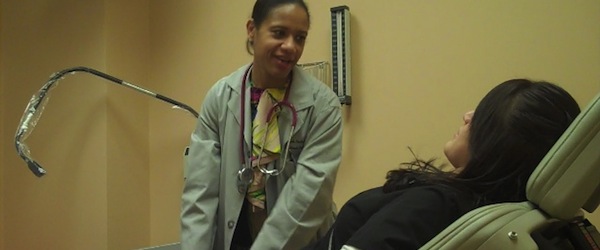
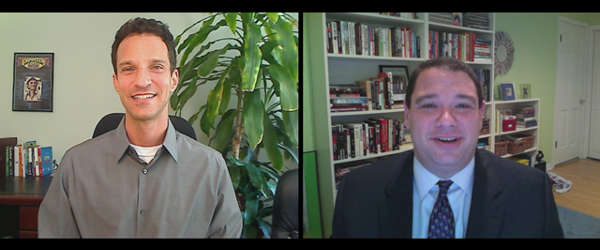
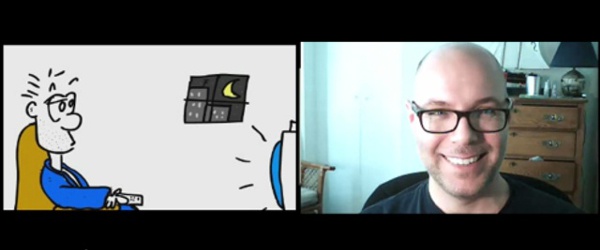
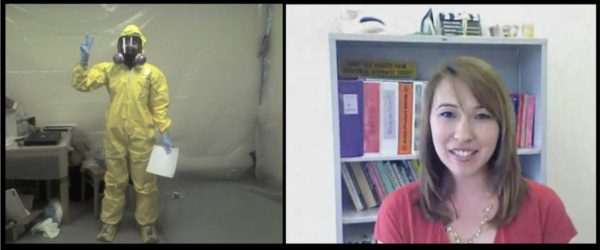
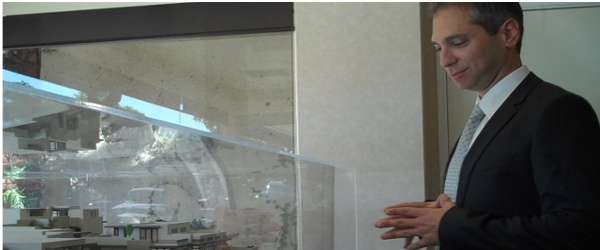
Great insight! Thanks for sharing. Really enjoyed the interiew format. Thanks Marc for asking great questions and thanks Gini for your direct approach in answering.
Thanks for the comment Bobby. Yeah, Gini is awesome. I checked out your site – we should stay in touch. As a fellow recruiter there should be some things we could do together down the road.
Excellent liked how Jeni gave details about what pr is & what it is not. Thats more about understanding how a companymakes their money and how they. Want to. Be perceived in the market.